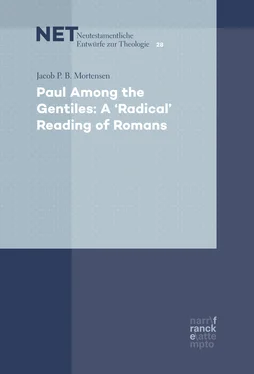With all the above-mentioned possibilities surveyed, what do I imagine to be the primary purpose and occasion behind Romans, from a historical and philological perspective, rather than a radical one? Paul’s primary purpose in writing Romans was to clarify questions and problems among Gentile followers of Christ in the Roman congregation. Some of these Gentile Christ-followers may have been proselytized Gentiles who, on the one hand, were considered Jews, because they had undertaken the most important Jewish identity marker (circumcision), but who, on the other hand, were not considered ‘real’ (historical-ethnic) Jews by other Jews, because they had converted to Judaism as adults, and had no genealogical connection to Judaism. That is, they were jewish ish Gentiles, or ex-pagan Gentiles. However, there may have been no proselytes at all in the Roman congregation to which Paul writes. But if there were, these proselytized Gentiles should be considered among the ‘weak’, and the most jewish ish of the Gentiles in the Roman congregation. But the conflict between the ‘strong’ and the ‘weak’, being a conflict between Gentiles only, still work if there were no proselytized Gentiles. All we need for a conflict between the ‘strong’ and the ‘weak’ is a group of (fanatic) God-fearers who observe the prescriptions of the (Mosaic) law concerning eating, drinking, and certain days. These Gentiles, in contrast to the other Gentiles in the assembly, still believed it to be mandatory to follow the (Mosaic) law concerning these matters. Paul wrote Romans to ensure that they coorporate as a group, and ‘welcome one another’ (14:1; 15:7), just as God (and Christ) has welcomed them into the family of Israel as Abraham’s heirs.22
Romans 14:1–15:6 deals with problems pertaining to the socio-religious distinctions within the Roman assembly, and also with the impression the assembly conveyed to the surrounding society. That is why Paul so early in his letter carefully depicts the person he is writing to: a proselytized, judaizing, jewish ish , ex-pagan pagan, Gentile-Jew who judges others (2:1), who relies on the law and boasts of his relationship with God (2:17), who knows the will of God, and can determine what is best because he is instructed in the law (2:18), who considers himself a guide to the blind, a light to those who are in darkness (2:19), a corrector of the foolish, a teacher of children, having in the law the embodiment of knowledge and truth (2:20), who teaches others, but does not teach himself, who preaches against stealing, but steals (2:21), who forbids adultery, but commits adultery, who abhor idols, but robs temples (2:22), who boasts in the law, but dishonours God by breaking the law (2:23), who does not do what he desires, but does the very thing he hates (7:15). The diatribe Paul addresses to this fictive Gentile interlocutor throughout the majority of Rom 1–11 serves as the foundation – and personification – of the problems Paul addresses in his specific admonitions to the Roman congregation in 14:1–15:6. That is how the unity, continuity, coherence, and sequence of the letter is maintained, while the specificity of the letter as a real letter with a real and specific situation, occasion, and purpose is preserved.
As a final speculation we may ask: What might be the reason(s) that Paul (primarily or exclusively) addresses this letter to the Roman Gentiles in this literary way? I offer three short answers or perspectives. First, he is an apostle to the Gentiles (1:5; 11:13; 15:16–17), and he addresses his letter to Gentiles in order to authorize and legitimize his apostleship to the Gentiles exclusively as the apostle to the Gentiles. Second, he fashions his address to Gentiles in order to arouse jealousy among the Jews (cf. Rom 9–11). This may be a tricky and ambivalent reason, but it may be a part of his missionary strategy, and he may have conceived of it as part of God’s handling of history. Paul may have conceived of this as God’s way of including both Jews and Gentiles, and in the end, it is a mystery (cf. Rom 11:26). Finally, Paul may fashion his address to Gentiles to accelerate the ‘Day of Wrath’, the Second Coming of Christ, and the end (ἔσχατος). This may be some kind of messianic logic in which Paul believed. Obviously, Paul perceives his missionary strategy to precipitate God’s judgement of the world. And when it happens, the dead will rise, and a new heaven and a new earth will replace the old. Hence, Paul wrote Romans exclusively with Gentiles in mind, in order for God’s reign to be complete. From this point of departure, the radical perspective may help studies of Romans to prove how far we can reach with such assumptions of audience and addressees in mind.
4 A fictive Gentile interlocutor – προσωποποιία
Paul’s educational background
Aelius Theon’s Progymnasmata (‘preliminary exercises’ i.e. to the study of rhetoric) date to approximately the first century CE.1 Theon’s Progymnasmata consist of seventeen exercises that prepared a student for the study of rhetoric through a series of short, but increasingly long and complex compositional practices. If Paul was instructed in the Progymnasmata , he may (but improbably) have been instructed by Theon’s account. This would have required him to be instructed in the second level (of three) of the ancient literate education. The consensus among New Testament scholars is that Paul received some sort of rhetorical instruction higher than mere reading and writing (first level instruction), but not to the level of sophistication of Philo of Alexandria or Josephus (a third level of education including technical rhetorical instruction and philosophy).2 The level of rhetorical instruction described in the Progymnasmata matches Paul’s level of education quite well, as evidenced by his letters. Besides, we know that the Progymnasmata were used as the culmination of the second level of education, as a transition to the third (and rhetorical) level. We may think of the Progymnasmata as a ‘high school’ ( gymnasium ) curriculum, beyond elementary education, but not at the level of philosophy. Stanley Stowers clearly summarizes the scholarly consensus on Paul’s educational attainments: ‘Paul’s Greek educational level is roughly equivalent to that of someone who had primary instruction with a grammaticus or a ‘teacher of letters’ and then had studied letter writing and some elementary rhetorical exercises’.3 This description corresponds to what Theon writes in the chapter on προσωποποιία: ‘Under this genus of exercise fall the species of consolation and exhortation and letter writing’ (Theon 1997, 70). From these observations we may infer that Paul probably received instruction in literate education up to the second level of education. And since he was instructed in the Progymnasmata at this second level, he would have received instruction in προσωποποιία, which is one of the elements or exercises of the Progymnasmata . There is no precise English translation of the Greek προσωποποιία, but it may be translated as something like ‘speech-in-character’ or ‘impersonation’.
In the Progymnasmata , Theon points out that the species of consolation, exhortation, and letter-writing fall under the genus of exercises in προσωποποιία (Theon 1997, 70). The grammaticus or second-level teacher would ask the student to compose a letter or a speech by imagining what a certain person would say to a certain addressee on a certain occasion. According to Theon, προσωποποιία is ‘the introduction of a person to whom words are attributed that are suitable to the speaker and have an indisputable application to the subject discussed’ (Theon 1997, 70). Hermogenes of Tarsus (who flourished in the time of Marcus Aurelius 161–180 AD), who also composed a Progymnasmata , explained that it was ‘an imitation of the character of a person supposed to be speaking’ (Hermogenes 2003, 84). These definitions reveal to us that the exercise of προσωποποιία consists of speech-in-character or impersonation, because it involves the creation of a fictive speech that fits the character of some legendary, historical, or type of person (Theon 1997, 70). The exercise requires the student to reveal a person’s character through speech, as that person confronts a specific circumstance. This is exactly the reason the Latin poet Ovid (43 BCE–17/18 CE) has the famous and mythico-historical characters in his Heroides write fictive letters – Penelope to Ulysses, Helen to Paris, and so on. Thus, if Paul had received instruction in letter-writing, he would have received instruction in προσωποποιία (and exhortation). Furthermore, as a fundamental part of the literate education in antiquity, προσωποποιία would be important, partly because the specific process of learning how to read ancient Greek texts involved the identification of characters and persons, partly because προσωποποιία was one of the elementary exercises closely related to learning prose and poetic composition in general. Therefore, Paul must have known how to identify instances of προσωποποιία before he knew how to produce pieces of προσωποποιία himself. The level of education reflected in Paul’s letters – even before one observes Paul’s own use of speech-in-character – makes it plausible that he received instruction in these subjects. Thus, reading Romans in terms of προσωποποιία offers a strong reading from a literary-historical perspective.
Читать дальше












